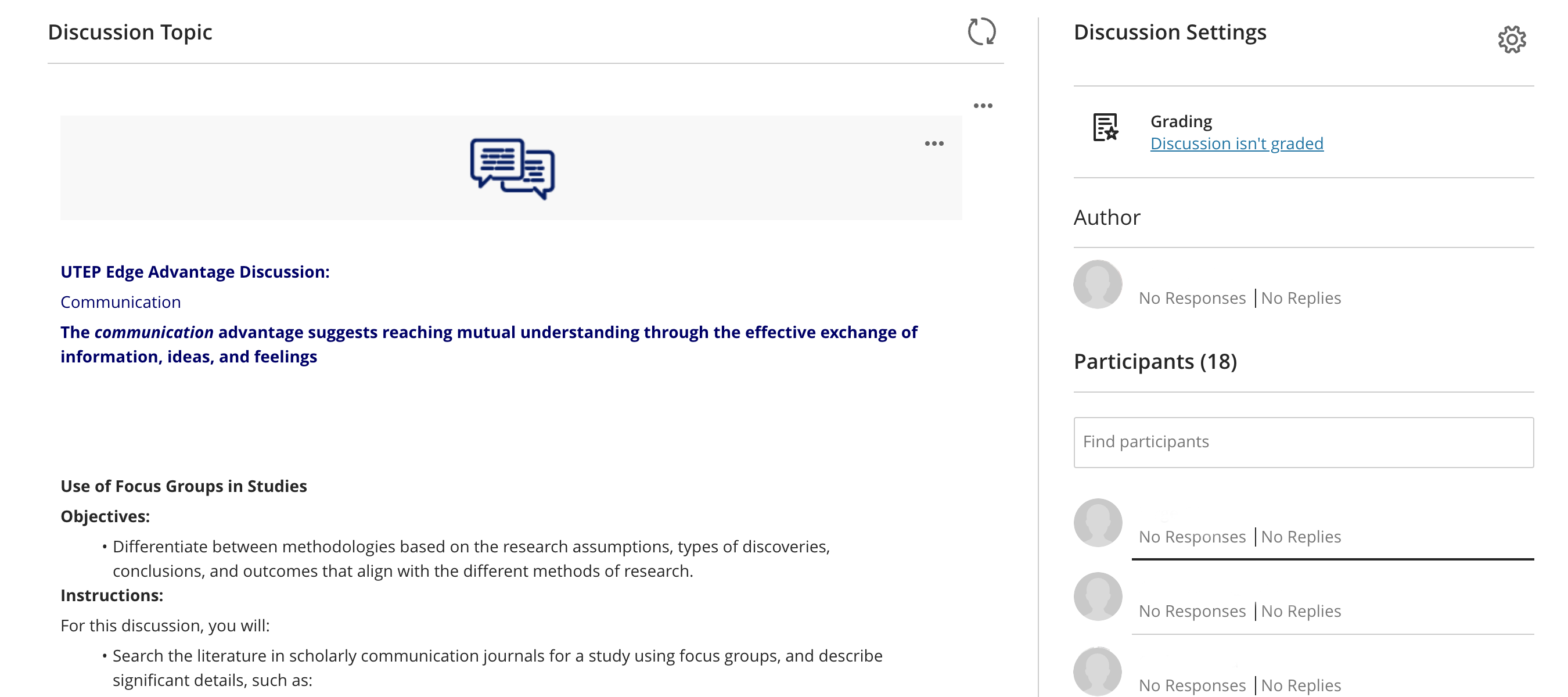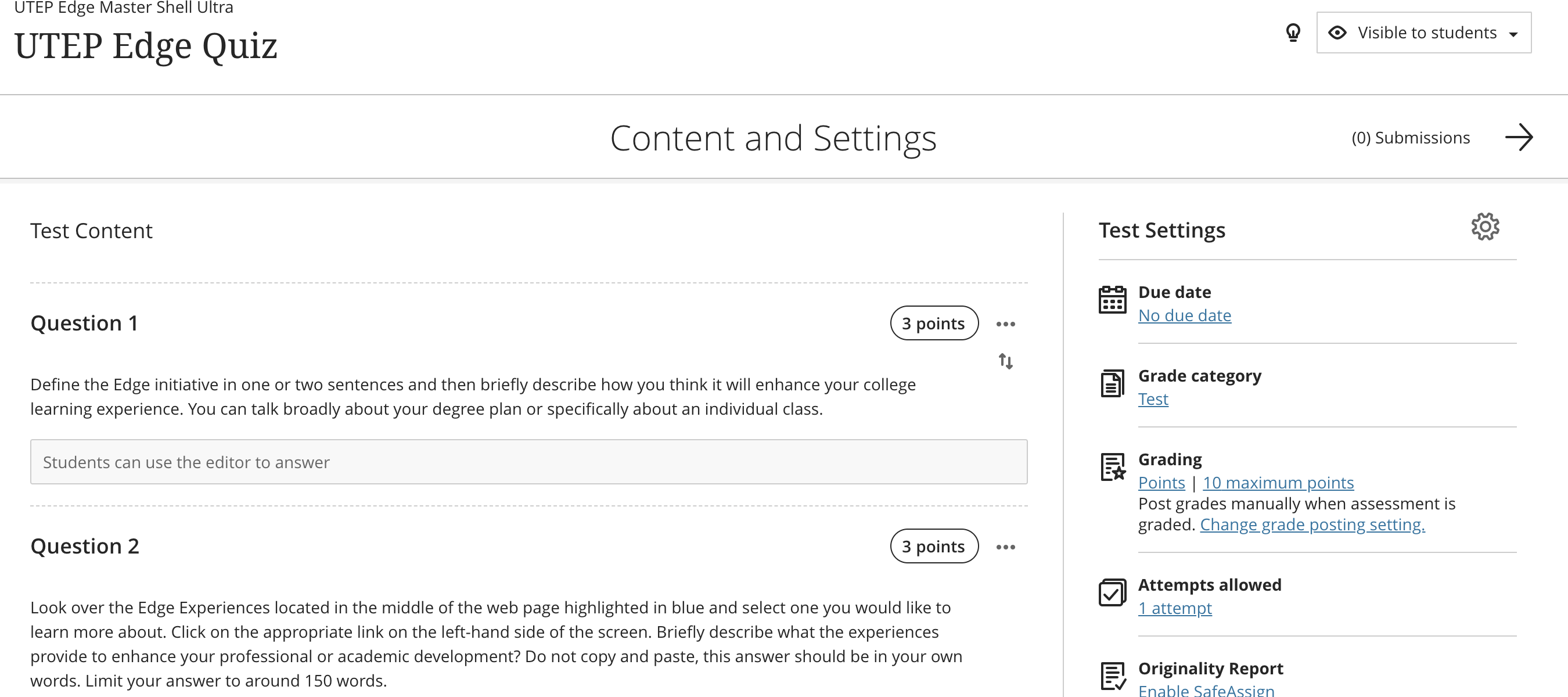UTEP Edge Resources
Students enter UTEP with many talents, great strengths, and big dreams. The UTEP Edge is a framework that aims to develop these assets through High-Impact Practices, or Edge Experiences, that are made possible by the expertise and dedication of our faculty, staff, alumni, and community partners.
It’s this competitive edge that distinguishes UTEP students from their peers at other institutions and prepares our graduates for leadership and lifelong success.
The following template has been created for instructors who are interested in taking their courses to the next level incorporating from three to five Edge advantages into their assignments.
This template includes a banner template, syllabi examples, a calendar template, a video explaining why UTEP Edge is important, assignment examples with UTEP Edge icons, Edge resources, and online Edge guidelines.
If you would like to be enrolled with your Blackboard username to view this template, please email us at instructionaldesign@utep.edu.



The Online Edge Guidelines support faculty with the implementation of the UTEP Edge student success program. The UTEP Edge is a framework that aims to develop these assets through High-Impact Practices, or Edge Experiences, that are made possible by the expertise and dedication of our faculty, staff, alumni, and community partners. This guide contains ideas to take your classes to the next level and cultivate the soft skills that employers have come to expect.
The following syllabi examples illustrate multiple ways faculty can inform students why the UTEP Edge is important to student success and how students can expect to cultivate soft skills like leadership and critical thinking in the form of high-impact experiences. If you have any questions, please ask your assigned instructional consultant.
POLS 2311 – Jesse Kapenga
After the completion of this course, students should have the following skills or knowledge:
-
Have a basic understanding of the US Constitution and political system.
-
Have a basic understanding of the Texas Constitution and political system.
-
Have a basic understanding of the El Paso political system.
Students will learn how to keep up to date with news and current events increasing their global and local awareness and media savvy.
Students will be able to connect textbook content to current events that are affecting the country, the state, the greater region, the community, and the students themselves.
Class discussions will encourage critical thinking and problem-solving in a group setting, as well as facilitate the exchange of information, ideas, and feelings with those who may have opposing or different points of view. This will build confidence by expressing one’s views to a small group as well as expressing these ideas to the class as a whole.
Students will attend on and off-campus community events, and connect those events back to concepts learned in the classroom. Students will be able to use these events to expand their network of resources both on and off campus.
History 1302 – Jerry Wallace
This course will concentrate on the following three edge advantages: Confidence, Communication, and Critical Thinking.
Confidence: To develop confidence in students' writing skills, this course will have the student write two reflective papers over primary source materials that will help students become more confident about writing about complex historical issues.
I will post a series of comments in the announcement section that will give critical feedback as a group on the success and opportunities for students in the class. In addition, I will send an email to those students that did exceptionally well on the assignment.
Communication: ONLINE learning is challenging because we don't get to meet face-to-face to have meaningful conversations about historical topics. In order to have a productive exchange of ideas about historical events, this class will participate in two online discussions that will examine controversial historical events and see students take a position on these events. In addition, students will also participate in an introductory discussion in which they introduce themselves to the class. This will enhance a productive exchange of ideas.
I will participate in these discussions, giving either a series of prompts or modeling the way for students to engage with each other in these short discussions.
Critical Thinking: One of the most meaningful skill sets you can take away from college is the ability to think critically about complex issues. This class is designed to help you develop that skill set. Over the course of the semester, students will enhance their abilities to think critically and develop informed opinions about historical events by taking four primary source quizzes. These quizzes are historical exercises in which students take positions on historical events based on a small reading selection, video, and the textbook.
At the conclusion of the assignments, I will post some comments on the ideas in the write-up, not syntax or prose, so students can think more critically or read against the grain in the next assignment. These comments will vary, but challenge students to think about the source or the writer of the source in a different light.
THEA 3351 – Adriana Dominguez
Students enter UTEP with many talents, great strengths, and big dreams. The UTEP Edge develops these assets through a variety of high-impact experiences made possible by the expertise and dedication of our faculty, staff, alumni, and community partners.
Ranging from undergraduate research and civic engagement to study abroad and student employment, these experiences increase confidence, enhance personal and professional skills, and equip students with a competitive advantage when they graduate and enter the workforce or pursue a graduate degree.
It’s this competitive edge that distinguishes UTEP students from their peers at other institutions and prepares our graduates for leadership and lifelong success.
1) Students will gain the skills to discuss and analyze written plays.
2) Students will gain an understanding of how theatre shapes our society and how theatre has been shaped by society.
3) Students will gather, understand, and present pertinent information about the theatre.
4) Students will write and communicate effectively about theatre history.
COMM 3323 – Eli Garcia
This course offers the opportunity for students to engage in discussions that foster 3 main UTEP Edge Advantages: Communication, Leadership, and Teamwork. Communication: This being a Communication course in itself, will offer a wide range of opportunities to analyze communication concepts and develop communication skills, but in particular discussion 1.2, invites us to explore the vital role of Communication within Leadership. Leadership: Likewise, this being a Leadership course, offers the opportunity to explore diverse leadership theories and concepts. Furthermore, discussion 1.3 will give us an opportunity to discover our own leadership style based on how our communication patterns impact others. Teamwork: Leadership and Communication rely heavily on teamwork. Discussion 4.1 invites us to reflect on the advantages and challenges of working in teams while analyzing under which circumstances it is pertinent to assign teamwork vs. individual work.
COMM 4372 – Maria de los Angeles Flores
This course is part of UTEP’s EDGE Initiative, which engages students in developing a series of assets in a variety of learning experiences distinguishing them from their peers at other institutions by preparing graduates for lifelong professional success. This class has been selected to participate in a feedback effort. Therefore, students will have an opportunity to voice their opinions regarding the UTEP EDGE experience by participating in a survey, which will be open during the first and last weeks of the semester. Each student who chooses to participate in the feedback exercise will receive 10 bonus points per survey for a total of 20 bonus points during the semester. Students’ participation is very important to Dr. Flores and it will be highly appreciated. For more information about this initiative, students are encouraged to visit https://www.utep.edu/edge/about/index.html. Students can also write to edge@utep.edu and/or call 915-747-5047.
1. In this class, students will participate in three UTEP EDGE experiences including Learning Communities, Research & Scholarly Activities, and Student Leadership.
A. Learning communities involve building friendships, gaining academic support, and connecting ideas across linked classes by joining a learning community.
B. Research & scholarly activities implies teaming up with faculty to gain experience and make intellectual and creative contributions to students’ field of expertise.
C. Student leadership entails developing professional values by assuming leadership roles in our UTEP campus experiences.
2. In this class, students will take part in the experiences described above through three specific learning goals, also known as EDGE Advantages. These goals are communication, critical thinking, and social responsibility.
A. The communication advantage suggests reaching mutual understanding through the effective exchange of information, ideas, and feelings.
a. Students will focus on communication by participating in our weekly discussion(s) forums in which they must write a post about their impressions of our weekly chapter(s).
b. Then, they must write a reply to two other classmates’ ideas/feelings about the weekly readings.
c. In this class, students are invited to participate in a total of 12 discussion boards—Introductions, contemporary life, scholarly research, sampling in survey research, use of focus groups, focus groups and social issues, historical research, deeper understanding, content analysis, rhetorical analysis, feminist criticism, and basics of research reports.
B. The critical thinking advantage deals with analyzing and evaluating issues to solve problems and develop informed opinions.
a. Students will focus on critical thinking by developing our weekly assignments by connecting the dots between methodological framework(s) and the practical fieldwork.
b. Students will engage in one to two weekly activities.
c. Those assignments are directly related to our weekly readings which present the methodological approach from a concrete explanation.
d. Weekly assignments/activities are designed to provide hands-on experience to students.
e. This course has 10 assignments—ethical research, the validity of research questions, methodology, survey research in organizations, open-ended questions in focus groups, bottom-up/top-down history, oral history, deconstruction, feminism & feminism theory, writing styles, and report formats.
C. The social responsibility advantage includes acting ethically and responsibly for the benefit of society and the public good.
a. Students will focus on social responsibility by learning about ethical research approaches in their week 1 reading “Ch 2: Knowledge, Culture, and Research” and their week 1 assignment “Steps to Ethical Research.”
The calendar image breaks down the course into manageable portions in a weekly format. Students may benefit from having a visual list of required tasks to complete as the course progresses. Faculty can customize their course calendar to best fit their needs, including additional columns like objectives, readings, and due dates.
|
Week |
Assignments |
Due |
Points |
|
Week 1
|
Discussion 1: Introductions |
Thursday |
2 |
|
UTEP Edge Discussion 2: Contemporary Life |
Friday |
2 |
|
|
Assignment: Ethical Research |
Saturday |
2 |
|
|
Quiz: Weekly reading quiz |
Sunday |
7 |
|
|
UTEP EDGE Quiz |
Sunday |
10 Bonus Points |
|
|
Week 2 |
Discussion: Scholarly Research |
Thursday |
2 |
|
UTEP Edge Assignment 1: Validity of Research Questions |
Friday |
2 |
|
|
Assignment 2: Methodology |
Saturday |
2 |
|
|
Quiz: Weekly reading quiz |
Sunday |
7 |
|
Integrating the UTEP Edge into existing assignments and activities allows students to strengthen their communication skills, develop informed opinions, and appreciate their own talents. Adding the UTEP Edge to an assignment requires students to articulate what they have learned by applying this new knowledge to their daily lives and professions. The following examples illustrate various ways faculty can implement the UTEP Edge.
Assignment

Group Assignment
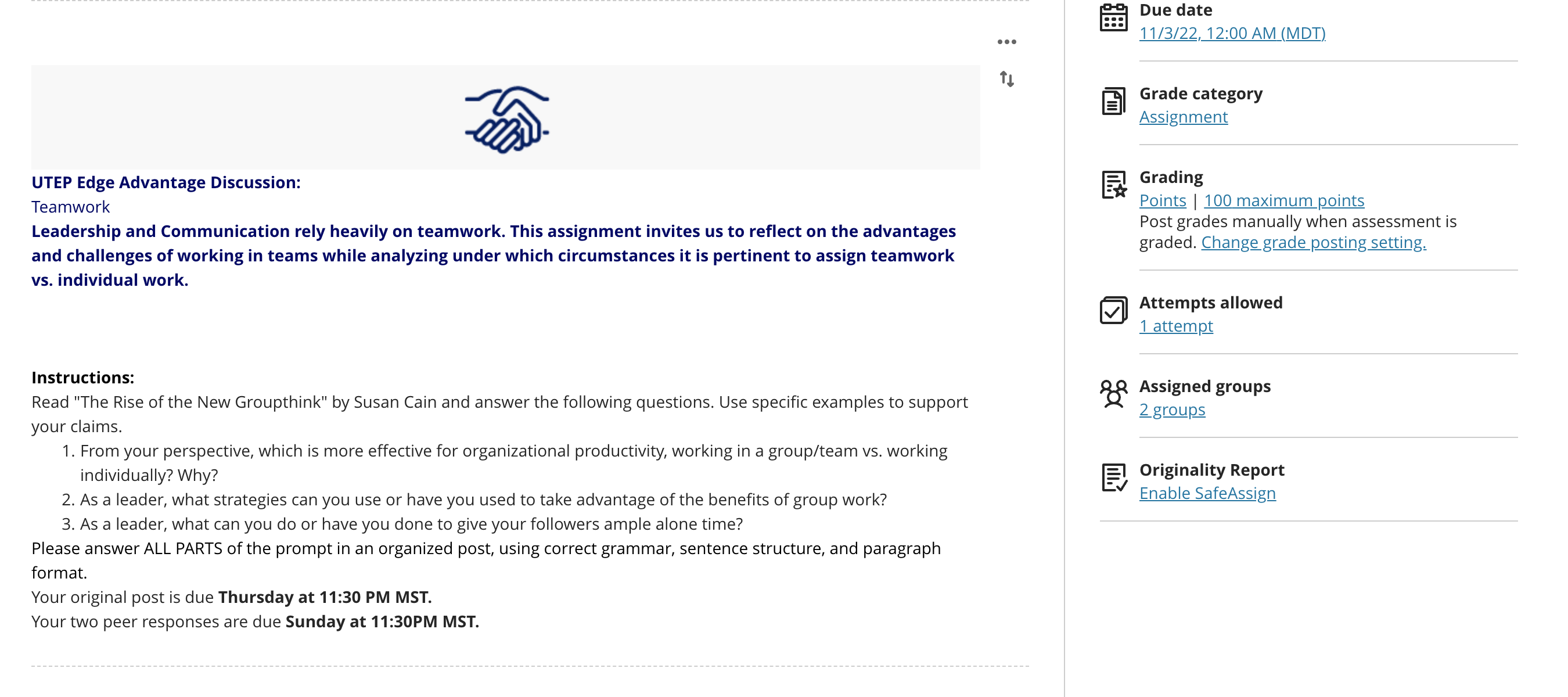
Presentation

Journal

Discussion Board
Discussion Video Assignment
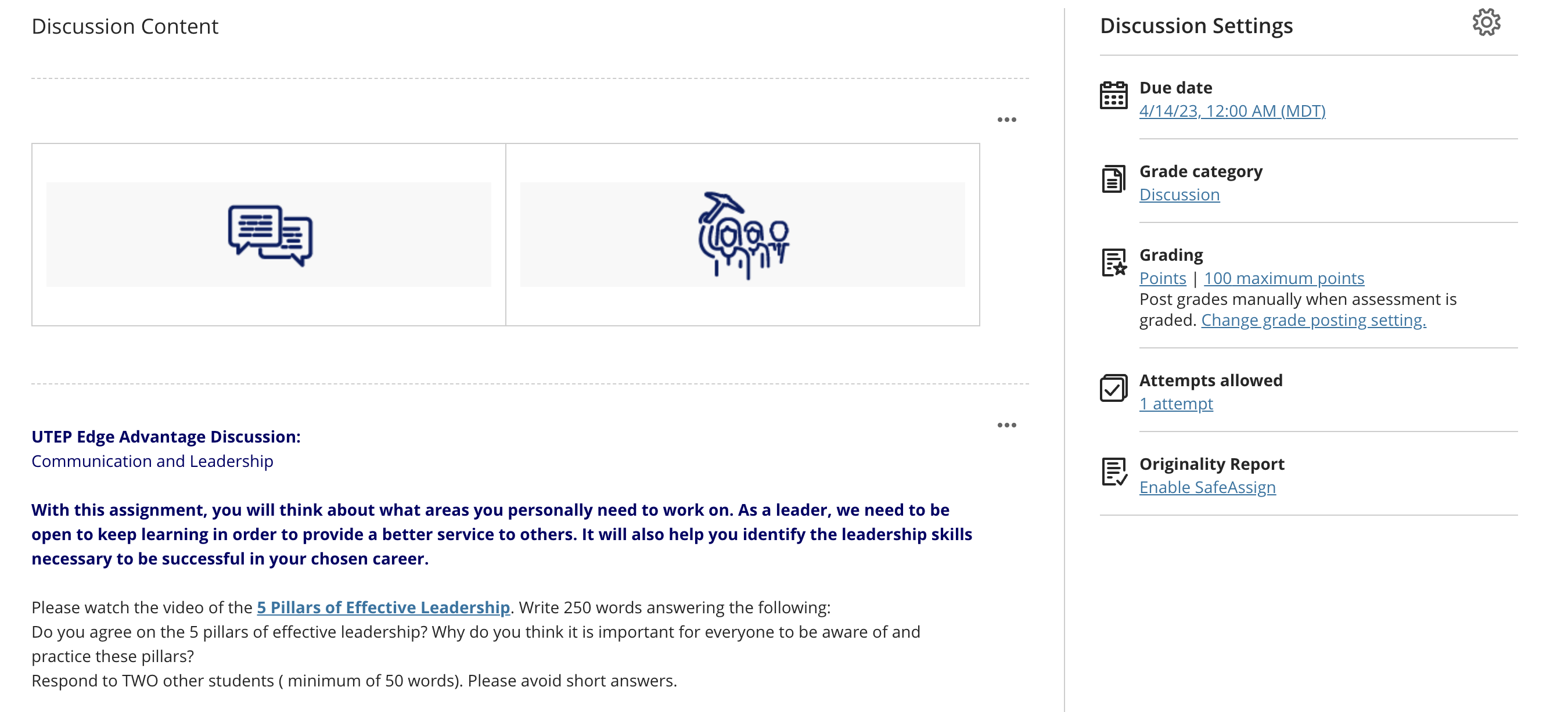
Homework
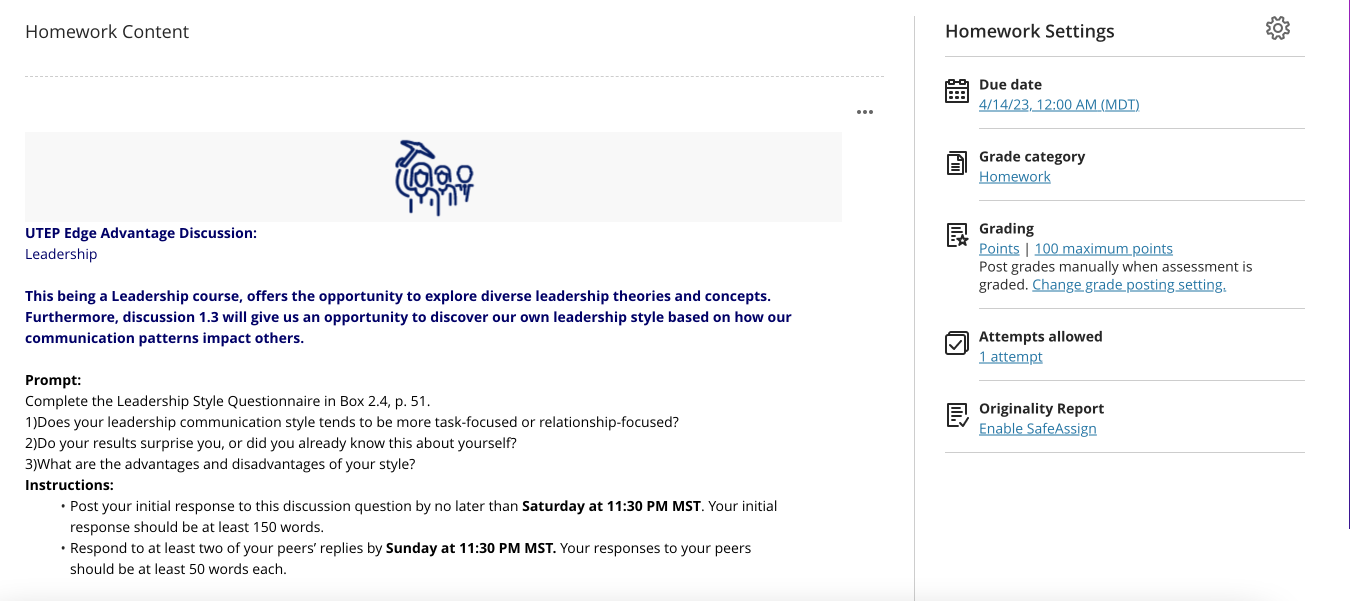
This simple quiz encourages students to visit the UTEP Edge website to learn what high-impact experiences they can expect while at UTEP. Additionally, students are encouraged to learn about the nine Edge Advantages and identify which are most valuable to them.
We want to know what you think! Students and faculty are provided an anonymous survey near the end of the course to share their feedback and suggestions with Extended University and the greater UTEP community. CID and Extended University use this feedback to improve our processes and the support we provide to faculty, staff, and students.
Faculty Survey
Faculty who participate in the UTEP Edge program are provided with a survey to gain feedback on their experiences. Faculty have the opportunity to share their thoughts about the redesign of the course content, the level of support they received from their assigned instructional designer, how students reacted to the addition of Edge experiences, and if the addition of these Edge experiences impacted their learning.
Student Survey
A UTEP Edge Student Survey is added to every Edge course where students are asked to answer some questions to help improve the course.
CID suggests instructors give extra credit to students to encourage them to complete this survey. To have control over how many students completed the survey, our team can add this survey as an Assignment to your course and ask students to submit a screenshot of their completion message. Your Instructional Designer will share with you the results after your course's end date.
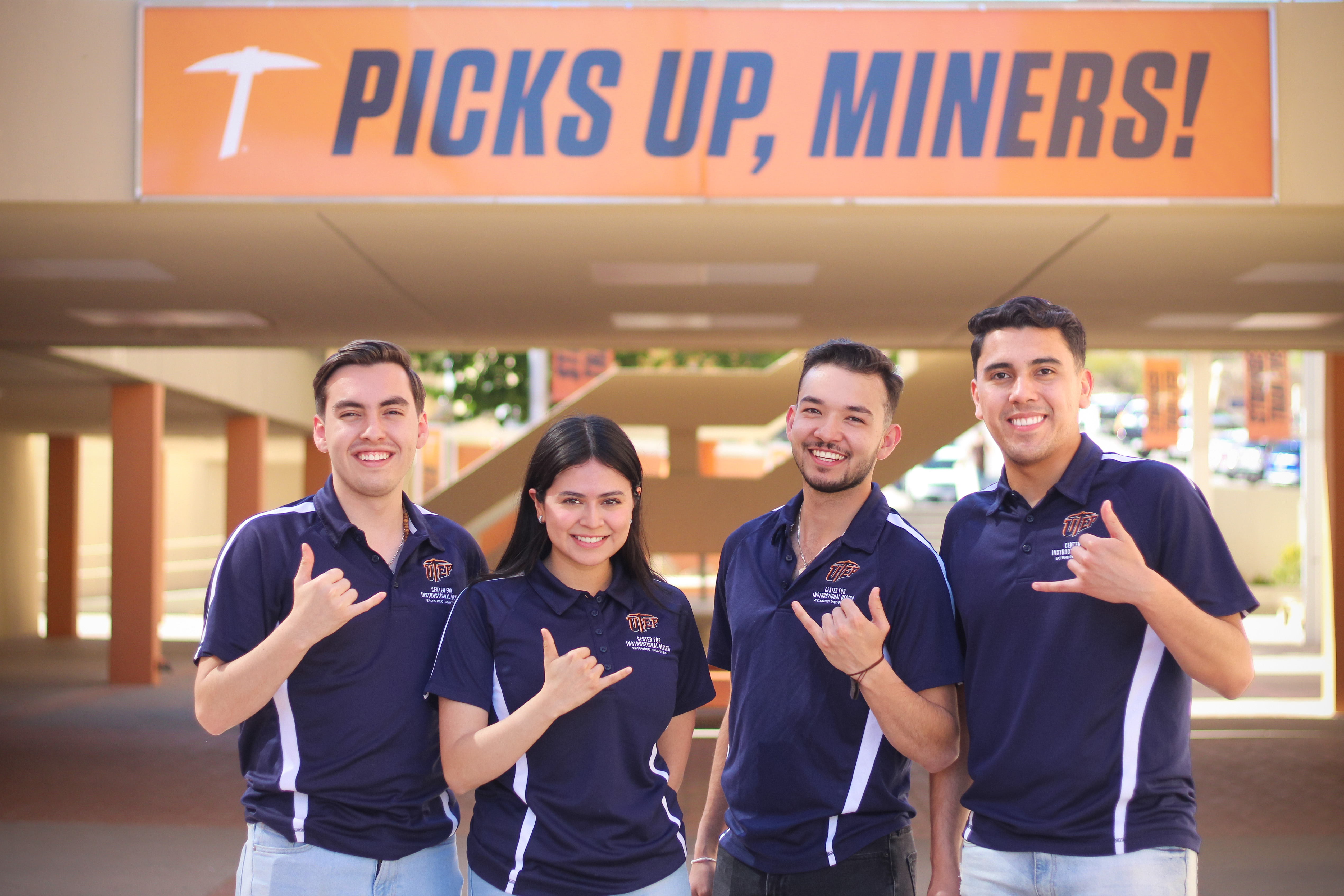
Students' Testimonials
- I liked this course and the instructor. This is the second Edge Advantage class I have taken so far, and the communication and leadership with Dr. Flores have been a much more wonderful and helpful experience. I have learned so much in this course, the reading materials were helpful and interesting. Overall a wonderful class and experience!
- Mr. Aguilar is fantastic and kind and helpful, and the course was very interesting and thought-provoking!
- The course and the course instructor were very good and I was able to learn more effectively. The instructor responded to questions in a timely manner and made classwork clear to understand.
- I'm satisfied with how the course is at the moment since it gives one the opportunity to concentrate and understand better what is necessary in order to grow as a person on many levels.
- It was an excellent course that I was able to incorporate my learning into real-world leadership at work. There is nothing I would change about the course or Professor Aguilar. He was super helpful and responded promptly and within minutes, not hours. Overall, I really enjoyed the course.
- This course was nicely balanced in reading and in assignments but did expose me to critical information that will be valuable in my future activities. Well organized and I will definitely recommend it to others.
If you would like to set up a consultation to learn more about UTEP Edge, please email us at instructionaldesign@utep.edu.

